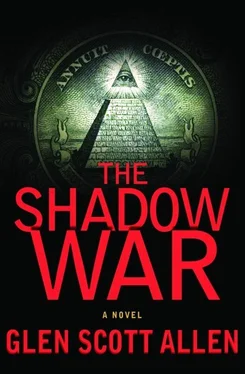Glen Allen - The shadow war
Здесь есть возможность читать онлайн «Glen Allen - The shadow war» весь текст электронной книги совершенно бесплатно (целиком полную версию без сокращений). В некоторых случаях можно слушать аудио, скачать через торрент в формате fb2 и присутствует краткое содержание. Жанр: Триллер, на английском языке. Описание произведения, (предисловие) а так же отзывы посетителей доступны на портале библиотеки ЛибКат.
- Название:The shadow war
- Автор:
- Жанр:
- Год:неизвестен
- ISBN:нет данных
- Рейтинг книги:5 / 5. Голосов: 1
-
Избранное:Добавить в избранное
- Отзывы:
-
Ваша оценка:
- 100
- 1
- 2
- 3
- 4
- 5
The shadow war: краткое содержание, описание и аннотация
Предлагаем к чтению аннотацию, описание, краткое содержание или предисловие (зависит от того, что написал сам автор книги «The shadow war»). Если вы не нашли необходимую информацию о книге — напишите в комментариях, мы постараемся отыскать её.
The shadow war — читать онлайн бесплатно полную книгу (весь текст) целиком
Ниже представлен текст книги, разбитый по страницам. Система сохранения места последней прочитанной страницы, позволяет с удобством читать онлайн бесплатно книгу «The shadow war», без необходимости каждый раз заново искать на чём Вы остановились. Поставьте закладку, и сможете в любой момент перейти на страницу, на которой закончили чтение.
Интервал:
Закладка:
"Fifteen thousand," he said.
Guy shook his head. "Eighteen, minimum absolu, " he said, trying to make his flabby chin look resolute.
Benjamin shrugged, tried to look disappointed but resigned. "D'accord," he said. He leaned over and said to Natalya, "For that much money, remember to take the glasses, all right?" Natalya nodded.
Benjamin took the valise into the dressing room to count out the money. He figured he wasn't really concealing anything from Guy, but better to at least appear cautious, or else Guy might feel he was being insulted as insufficiently threatening.
He returned, counted the money into Guy's fat palm, and then added another thousand euros "pour votre discretion." Guy smiled, nodded appreciatively.
Guy escorted them to the door, told them to return in two hours' time. Before they left, Benjamin turned and asked Guy another question, to which Guy gave a somewhat prolonged answer. Then they shook hands good-bye, Guy bid them "Jusqu'a plus tard" and closed the door.
When they reached the street, Natalya turned to him.
"What did you just ask him?" she said. She sounded a bit suspicious.
"I was curious. I've seen enough films to know such people as Guy use the names of the deceased for fake passports."
"Yes," said Natalya. "Like Gogol's seller of dead souls."
Benjamin laughed. "I also know databases of such names have improved the last few years, and that they're international. Believe me, I've dealt with enough such lists to know. But he assured me he's well beyond such shopworn techniques, that his methods were thoroughly moderne."
"Then where does he get the names?" Natalya asked.
"From a friend in the prefect's medical office. But not names of the dead. He uses the names of the near -dead-people who are in comas. Still alive, but unlikely to turn up at an inconvenient moment."
Natalya blanched. "You mean, we will be using such names?"
Benjamin nodded. "Try not to be too superstitious about it," he said. "Think of it as giving them a vicarious adventure."
"I will try," Natalya said. But she didn't look convinced.
CHAPTER 38
When Benjamin and Natalya left Guy's studio, they walked west toward the avenue de la Republique. As they approached the small park set between boulevard Risso and avenue Gallieni, the buildings became older but more respectable, displaying more of the Italian influence in their arches and white stone and carrying their history with a certain grace and confidence. The day was still bright and warm and, as they strolled, Natalya linked her arm through his.
"So, we have two hours to kill," Benjamin said. " Now can we be tourists?"
"And will you be my guide, Commissar?" she asked.
"Well, I happen to know there is a museum just down the street, in the place Garibaldi. The Musee d'Art Moderne. It's supposed to be quite a beautiful building. And they have Warhols, Lichtensteins. All the 'old masters,' " he said, smiling.
"Western decadence." She smiled, but then she grew serious. "On such a day, in such a place, I would rather spend what little time we have here outside. I would much rather find a cafe, sit and have a coffee, and watch the ocean. Do you mind?"
Benjamin didn't mind at all. They continued walking on, through place Garibaldi with its beautiful baroque-style eighteenth-century Chapelle du Saint-Sepulcre and its famous statue of Giuseppe Garibaldi, the "Hero of the Two Worlds" according to a plaque on the monument. They turned on rue Cassini, with its wine shops and cafes, and followed it until they reached quai Lunel, which formed the western edge of the three-side Port Olympia, where fewer of the enormous pleasure yachts were anchored than the night before, their masters out at sea, taking advantage of the clear and warm fall weather.
They chose a cafe near the water, ordered two coffees.
"Last night," Benjamin said, "you mentioned there was a long history of Russians in Nice?"
"Well, yes. During the Tsar years, Russians considered Nice the prime spot to vacation, after the Crimea. By the time of the Revolution, there was a large Russian community here."
"And then I suppose many of the Whites came here?" Benjamin asked.
"Not just the Whites," Natalya said. "Even the Revolution has roots here. In 1905, inspired by the St. Petersburg revolution, a rich emigre, Savva Morozov, wrote a will leaving his entire estate to the Communist Party. Then he shot himself. Or at least that is the official story. But it did not stop there. His nephew, Nikolai Schmidt, did the same thing."
"Shot himself?" Benjamin asked. Natalya nodded. "How convenient," he said.
"Wait, it gets even more… convenient," she said. "The nephew left no will. Now, the bequeathment was to the entire Communist Party, but there were factions within the Party: Bolsheviks, Mensheviks, Socialists… Each wanted the money only for itself. And each was expecting the others to cheat. Lenin knew this. So, ignoring the Socialists completely, he made an extraordinary proposal to the Mensheviks: they would each send a loyal member to the nephew's two sisters, to court and try to marry them and thus gain their inheritance. If both succeeded, fine, each faction would get half the money. If only one succeeded, well, the luck of the draw, whoever 'won,' that was fate. Understandable?"
"Yes," said Benjamin. "Not particularly admirable, but understandable."
Natalya smiled, continued. "So, our two political paramours make their way to Nice. They find the sisters-who, I believe, were not known for their charm or beauty-and they court them. Then even marry them. Both have succeeded! Both factions will get their share, yes?"
"That was the agreement."
"But for one thing: the Menshevik 'volunteer' was not really a Menshevik. He was secretly a Bolshevik, planted in the other faction by Lenin."
"So the entire inheritance-"
"Went to Lenin and the Bolsheviks. You see, they were always like that. Plots within plots within plots. Like matryoshka, nesting dolls."
At the mention of plots, Benjamin grew pensive, sat staring out over the ocean.
Natalya reached over, put her hand on his. "Enough ghost stories," she said. "Let's keep walking."
And so they'd spent the next hour strolling along the quai des Etats-Unis, with its stretch of luxurious modern hotels fronting the white-sand beach, and the Musee Masenna, housed in an ornate nineteenth-century villa, surrounded by elaborate and colorful gardens. Benjamin wanted to go in, but their two hours playing normal tourists was nearly up; it was time to return to Guy's studio and the reason they were really here.
They hailed a cab and were soon descending the stairs to Guy's weathered door. But taped to the door they discovered an envelope, with MONSIEUR BENJAMIN written on the outside. Benjamin took down the envelope and opened it. Inside was a note, in French, with Guy in a florid signature at the bottom. Benjamin quickly scanned its contents.
"What does it say?" asked Natalya.
"Well, it says that he is terribly sorry- terriblement desole -but that he had to meet someone in Cannes this afternoon. He asks that we meet him there around three o'clock."
"In Cannes?" Natalya said. "Is he serious?"
"Actually, it's not that far," Benjamin said. "Just twenty-five kilometers or so down the coast. But not actually in Cannes. He says there's an island, just off the coast. St. Honorat. He wants us to meet him there, as it's more approprie for our kind of business."
Natalya looked suspicious. "This makes no sense. Perhaps it would be wise not to go."
"And then what would we do for passports?" asked Benjamin. "Have you decided to risk using your own?"
Natalya frowned, shook her head. "I think you believe this is as strange a request as do I."
"Yes, I do," he agreed. "But I don't see any option. And I've heard of this place. There's a monastery there, a very old one. It's supposed to be quite… scenic," Benjamin finished with a smile. "Consider it another triumph of the Commissar of Sightseeing."
Читать дальшеИнтервал:
Закладка:
Похожие книги на «The shadow war»
Представляем Вашему вниманию похожие книги на «The shadow war» списком для выбора. Мы отобрали схожую по названию и смыслу литературу в надежде предоставить читателям больше вариантов отыскать новые, интересные, ещё непрочитанные произведения.
Обсуждение, отзывы о книге «The shadow war» и просто собственные мнения читателей. Оставьте ваши комментарии, напишите, что Вы думаете о произведении, его смысле или главных героях. Укажите что конкретно понравилось, а что нет, и почему Вы так считаете.












